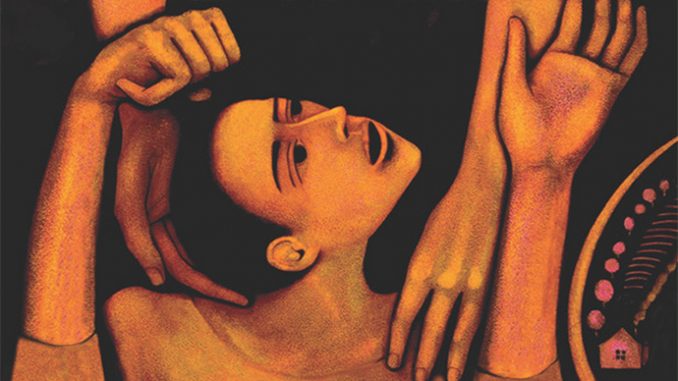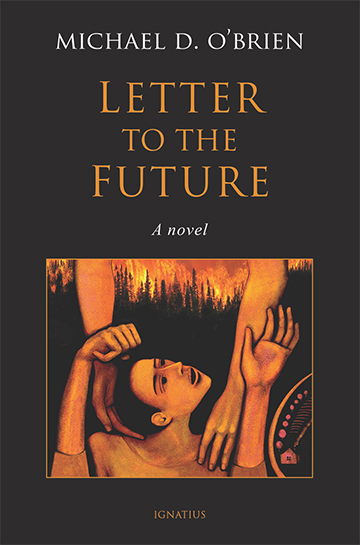
Are we living in apocalyptic times?
No one can answer this question definitively, though many quarters of both society and the Church suggest responses. Perhaps the more important question is the perpetual issue: How shall we live in these times?
An author well worth reading on this question is Michael D. O’Brien, whom OSV podcaster Jason Adkins calls “one of the great spiritual writers of our age,” and no less an intellectual authority than Peter Kreeft has deemed “the greatest living Catholic novelist.”
O’Brien has now written sixteen novels that have been translated into fourteen languages. His most recent novel is Letter to the Future, published earlier this year by Ignatius Press.
This novel’s publication concludes a very fruitful time for O’Brien, now in his seventies, who lives in eastern Canada. 2019 saw the publication of The Art of Michael D. O’Brien, a suitably large collection of his sacred paintings, which included “Creation of the Birds,” a profound portrayal of Trinitarian creativity that graces the cover of Living Logos, my new book on O’Brien’s fiction.
In 2022, O’Brien published By the Rivers of Babylon, which is not only a historical novel about the Babylonian Captivity but a reflection on the current spiritual crisis in the Catholic Church.
And O’Brien’s novel The Lighthouse (2020) is being made into a short film by Eric Groth and Andrew Hyatt, the creative duo who gave us the brilliant film “Wildcat,” starring Maya Hawke as Flannery O’Connor.
Some who have not yet read Letter to the Future might dismiss it as doomsday fiction from the author of Father Elijah, O’Brien’s first and perhaps best-known novel, published in 1996. That novel did indeed give a fictional account of a priest, Fr. Elijah, who confronted the rise of the Antichrist.
O’Brien’s approach to the Book of Revelation was clarified in both a prequel, Sophia House, about the formation of Fr. Elijah, and a sequel, Elijah in Jerusalem. The latter ends with the same page of Scripture that concluded Father Elijah, but reminds readers of other spiritual wisdom, most notably that time is in God’s hands.
Letter to the Future reminds us of other essential truths. While telling the story of how God gathers a remnant to preserve the Church despite the end of our current civilization, O’Brien portrays the repetition of ancient errors as central to the collapse of modernity.
As in the original Satanic temptation that we could ourselves be gods, or as in the Babylonian Captivity that results from worshipping another god, O’Brien’s purpose here is to remind us of the mortal dangers of “self-deification.” He wants us, and the children of the future, to understand “how and why” this error so corrupted modern civilization.
O’Brien’s approach to the story is set in his home country of Canada, but contains none of the spiritual pride that many associate with end-times speculation. Rather, O’Brien admits that he is like most of us in not fully understanding what is now happening in either the Church or society, but concludes with the witness of the main narrator of Letter to the Future, Cleve Longwood (the modern ancestor of the children of the future to whom the novel is sent), who humbly reflects:
We hobble along half blind, ever-repenting, trying to love in all circumstances. Invoking the supernatural grace of Hope, converting fear into trust. Practicing thankfulness for all things, the sweet and the bitter, the soft and the hard. Offering to others our little bits of bread, baked in the kitchen of our weakness.
Cleve further explains, in terms central to O’Brien’s art: “With the passage of time I have come to believe that there are different ways of imparting truth”; by this, he does
not mean the writing of literature (I long ago abandoned that persona); nor do I mean philosophical arguments to change people’s thinking… nor do I mean historical data and analysis for the informing of mind… I mean instead our own deepest heart-soul words—living logos.
O’Brien’s Letter to the Future is bread worth eating, with words worth reading, pointing us towards the Bread of Life, the living Word, Who alone can sustain us eternally.
If you value the news and views Catholic World Report provides, please consider donating to support our efforts. Your contribution will help us continue to make CWR available to all readers worldwide for free, without a subscription. Thank you for your generosity!
Click here for more information on donating to CWR. Click here to sign up for our newsletter.




Highly recommended.
I’ve read ‘Letter to the Future’ twice. The first time I got so caught up in it that I read it in 2 days.
Mistake.
I realized that I had made a mistake and so I put the book down for about a month and then picked it up again. This time I MADE myself give it 2 weeks, and this time I got more out of it. It’s been 5 or so months now so pretty soon I can tackle it again – winter is on the way.
‘The Lighthouse’ is the kind of book you read and as you are reading it you realize that there are others you know who NEED to read it, and I’ve sent out 5 copies and have received effusive thanks for doing so.
IMO we are living in apocalyptic times, and this has been one of O’Brien’s themes in most of his writing.
Apocalypse is always with us. An existential theme to write novels. For many a distraction from our own apocalyptic experience in simply dying.
O’brien instead has captured the analogy of history to our present anguish writing By the Rivers of Babylon. That certainly makes for worthy reading. An effort by O’Brien said by Greg Maillet to open our consciousness to the “living Logos”.
No longer a reader of novels, my contribution is to the end of O’Brien’s efforts, our intimacy with the Logos. Nevertheless reading draws us into a community of believers, good fiction meaning fiction with something meaningful to say ignites in us a commonality that forms a living community. The Word gives that living spark that is intended to become an undying flame of love. Intimacy with the Word. When we decide to rise above the current verbal engagements, not necessarily to abandon what must be said rather to focus our deepest passions where they belong, where they become sacrificial and fragrant to God.